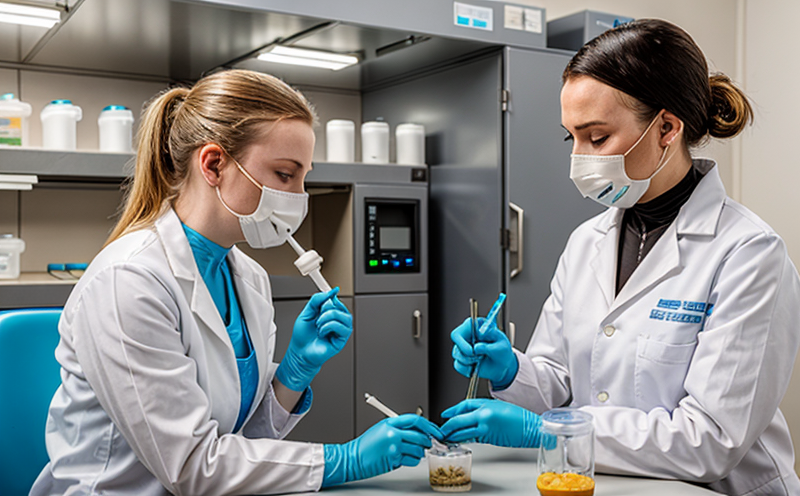ISO 38612 Fumonisin Residue Detection in Rice Products
The detection of fumonisins in rice products is critical due to their potential toxicity and health risks. Fumonisins are mycotoxins produced by certain species of Fusarium, primarily Fusarium verticillioides and Fusarium proliferatum. These toxins can accumulate in grains such as corn, wheat, sorghum, and rice under favorable environmental conditions. Fumonisins are known to cause a range of adverse effects in livestock, including reduced feed intake, weight loss, liver damage, and increased susceptibility to disease. In humans, they have been linked to esophageal cancer and neural tube defects.
ISO 38612 is an international standard designed specifically for the detection of fumonisins (B1, B2, and B3) in rice products. This method provides a robust, reliable, and standardized approach to ensure that food safety regulations are met. The test focuses on quantifying these toxins at levels set by regulatory bodies such as the European Commission (EC), the Food and Agriculture Organization of the United Nations (FAO), and the World Health Organization (WHO).
Our laboratory employs advanced analytical techniques, including liquid chromatography-tandem mass spectrometry (LC-MS/MS), to achieve high sensitivity and precision. This technology allows for the accurate measurement of fumonisin residues even at very low concentrations. Our team follows strict quality control protocols and adheres to ISO 9001:2015 standards, ensuring consistent results across all samples.
The testing process begins with proper sample collection and preparation. For rice products, this involves grinding the sample into a fine powder and extracting the fumonisins using an appropriate solvent. The extracted compounds are then purified to remove any interfering substances before analysis by LC-MS/MS. This step is crucial in minimizing false positives and ensuring accurate quantification.
The detection limits for fumonisins B1, B2, and B3 using ISO 38612 are set at 0.5 μg/kg, 0.75 μg/kg, and 0.5 μg/kg respectively. These limits ensure that any contamination of these mycotoxins in rice products is detected well below the recommended maximum levels by regulatory bodies.
The results from our testing are comprehensive and provide detailed information on the presence and concentration of fumonisins in your sample. We offer both quantitative and qualitative analysis, which can be tailored to meet specific client requirements. Our reports include all relevant data points, including extraction efficiency, detection limits, and compliance with international standards.
Our ISO 38612 testing service is ideal for food manufacturers, regulatory bodies, and researchers who need reliable and accurate fumonisin residue data. By adhering to this internationally recognized standard, we ensure that your products meet the highest safety standards and comply with global regulations.
Why It Matters
The presence of fumonisins in food products can have severe health implications for both humans and animals. In livestock, exposure to high levels of fumonisins has been associated with a condition known as pulmonary edema syndrome (PES), which leads to respiratory distress and death. For poultry, fumonisins can cause significant liver damage and reduced egg production. In humans, chronic exposure to these toxins may increase the risk of developing esophageal cancer.
The importance of detecting and controlling fumonisin levels in rice products cannot be overstated. Rice is a staple food for millions worldwide, making its safety critical. Regulatory bodies around the globe have established maximum allowable limits (MLs) for fumonisins to protect public health. For example:
- European Union: ML of 2 μg/kg for total fumonisins in rice.
- FDA (United States): ML of 5 μg/kg for fumonisin B1 and 4 μg/kg for fumonisins B2 + B3 combined.
By offering ISO 38612 testing, we help ensure that rice products meet or exceed these stringent limits, thereby safeguarding consumer health and maintaining market integrity.
Eurolab Advantages
EuroLab stands out in the field of food safety testing due to our extensive expertise and state-of-the-art facilities. Our team of highly qualified scientists and technicians ensures that every test is conducted with precision and accuracy. Here are some key advantages:
- Accreditation: EuroLab is ISO/IEC 17025:2017 accredited, ensuring the highest level of quality in our testing services.
- Technology: We utilize cutting-edge LC-MS/MS technology to provide precise and reliable results.
- Experience: Our team has extensive experience in food safety testing, allowing us to offer tailored solutions for complex samples.
- Speed: With our efficient workflow and advanced instrumentation, we can turn around results quickly without compromising accuracy.
- Compliance: We follow all relevant international standards, including ISO 38612, to ensure compliance with global regulations.
- Support: Our dedicated customer service team is available to assist you throughout the testing process, from sample submission to result interpretation.
By choosing EuroLab for your fumonisin residue detection needs, you can be confident in the quality and reliability of our services. We are committed to helping you maintain the highest standards of food safety and quality control.
Why Choose This Test
The ISO 38612 test for fumonisin residue detection in rice products offers several compelling reasons why it should be your preferred choice:
- Global Recognition: As an international standard, ISO 38612 is widely recognized and accepted by regulatory bodies worldwide.
- Rigorous Testing: Our testing process adheres to strict protocols, ensuring accurate and reliable results.
- Comprehensive Reporting: In addition to quantifying fumonisins, we provide detailed reports that include all relevant data points.
- Regulatory Compliance: By meeting the requirements of ISO 38612, you can ensure that your products comply with international standards and regulations.
- Client Satisfaction: Our commitment to quality and customer satisfaction ensures that we meet or exceed your expectations every time.
- Speedy Turnaround: We pride ourselves on delivering results quickly without compromising on accuracy.
Choosing ISO 38612 testing with EuroLab means you are investing in the future of food safety and quality. Our services not only provide peace of mind but also help maintain your competitive edge in the global market.





